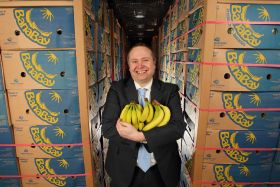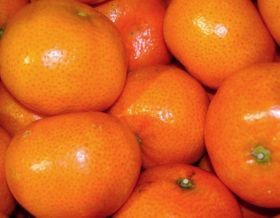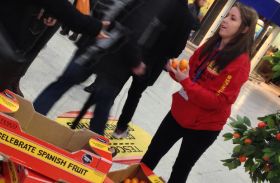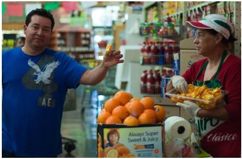Citrus
Fast-growing banana marketer broadens its range beyond tropical fruits with addition of New Zealand apples and Mexican limes to its offer
BanaBay, the rapidly emerging tropical fruit distributor-marketer with headquarters in the UK and plantations in Ecuador, is branching into new products.

From this month, the company will be able to offer New Zealand apples and Mexican limes for the first time.
Known primarily for Ecuadorian bananas, BanaBay stated to the media that it was responding to customers’ requests for apples, which, while outside the tropical fruit basket, are “a very popular choice”.
The company has chosen to source its apples from New Zealand, already a key market for BanayBay’s bananas, citing the country’s ideal growing climate and reputation for developing exciting new varieties. BanaBay’s varietal range will include Royal Gala, New Zealand Queen, Pacific Rose and Braeburn.
“While our core business remains our Ecuadorian-grown bananas, we have always prided ourselves on our flexible and responsive customer service so when a product is requested, we can act fast to source the best fruit and add it to the suite of products,” said managing director Mark O’Sullivan.
BanaBay is also venturing into the citrus market with the addition of Persian seedless limes. Cultivated on GlobalGAP-certified farmland in Mexico, the fruit, which is in high demand for pan-Asian cuisine and cocktails, will become an integral part of its range, which also includes also includes bananas, pineapples and baby bananas.
Darijo Srna, of Shakhtar Donetsk, has bought 20 tonnes of tangerines for children in Ukraine suffering amid scenes of war

Shakhtar Donetsk’s Croatian international footballer and club captain Darijo Srna has bought 20 tonnes of tangerines for children in Ukraine, the Croatian daily Vecernji List has reported.
Srna was born in Metkovic, a region of southern Croatia well known for its tangerines. Croatia left communist Yugoslavia in 1991 and then fought a four-year war of independence.
“I grew up in Croatia so I also went through a period when I needed help. Donetsk has helped me a lot and this is just a small gift with which I want to pay them back,’ the daily newspaper quoted the 32-year-old as saying.
The Ukrainian top-flight side said on its website: “The lorries carrying the fruit bought in Darijo’s hometown Metkovi have already arrived in Donetsk.”
The tangerines will be distributed to at least 20,000 local children with a special greeting card for every child, the club statement said.
First marketing campaign following recent signing of direct supply deal with AMC Group offers boost for Spanish fruit
Tesco is promoting Spanish citrus to the general public in London this week, giving away a high volume of fresh oranges to passing commuters at King’s Cross and Waterloo railway stations.

The promotion, organised by London-based PR agency The Little Big Voice, is the first major promotion to be run by the retailer following the recent contract signing of a five-year deal with its major citrus supplier, Murcia-based AMC Group, to form a joint venture direct supply company AMT Fruit.
AMT is now supplying citrus to Tesco on a global basis via the retailer’s international Group Food Sourcing hubs, sourcing and distributing lemons, limes, satsumas, clementines, oranges, tangerines and grapefruit for sale through its various regional businesses.
The partnership is also aiming to deliver new ranges and produce to Tesco customers and the best varieties in the market through AMC’s varietal development and breeding programme, Citrus Genesis.
Speaking at the Eurofruit Congress Southern Hemisphere in Lima on 6 November, AMC chief executive Alvaro Muñoz revealed that around 857ha had already been planted with Citrus Genesis varieties in South Africa, Peru, Spain, Turkey, Israel, Morocco, Australia, Egypt and Chile.
Production of the group’s protected varieties is expected to reach 14,000 tonnes this year and estimated to rise to 45,000 tonnes by 2017, he added.
Citrus committee is ramping up efforts to open Chinese and Brazilian market
Chilean citrus exports are set to fall in 2014 due to the effects of last September’s freeze and a drought in the IV region, which has cut production across all main varieties.

Monserrat Valenzuela of the Chilean Citrus Committee told Fruitnet that the biggest drop is likely to be seen in clementines with shipments forecast to fall by 13% to 27,705 tonnes. Orange exports are expected to be down 9% at 64,130 tonnes, while mandarin shipments are set to rise by 5% to 33,233 tonnes.
Although lemon production is also down, the committee said exports would most likely remain similar to last season as companies seek to take advantage of undersupplied international markets.
The US is the main destination for Chilean citrus, absorbing almost 80% of total export volumes. Asia – principally Japan – accounts for another 10%, while a further 6% is sent to Europe. Valenzuela said one of the committee’s top priorities this season is to gain authorisation to ship to China and Brazil.
A decision has been taken by the EU to strengthen rules on imports of South African citrus due to the risk of citrus black spot

South African citrus exports to Europe will be subject to stricter controls but will not face an outright ban, Eurofruit has learned, after the EU’s Standing Committee on Plant Health reached agreement on a revised import protocol today in Brussels.
The agreement reached by the committee marks the end of a particularly difficult chapter in the history of trade relations between South Africa and the EU, one which saw producers in Spain, Italy and France demand South African citrus be denied entry on the grounds of a perceived risk of the disease citrus black spot establishing itself in Europe.
According to the new measures, citrus fruits imported from South Africa will be subject to more stringent criteria such as recording pre- and post-harvest chemical treatments and mandatory registration of packhouses, as well as on-site official inspections at citrus orchards.
A sample of at least 600 of each type of citrus fruit per 30 tonnes will have to be taken by the South African authorities, with all fruit showing symptoms to be tested. Moreover, a sample per 30 tonnes of Valencia oranges will also be tested. No distinction between citrus fruits for fresh consumption and citrus fruits for processing is made.
Commissioner for Health Tonio Borg commented: “Plant protection on EU territory is of the utmost importance and the EU had no choice but to impose a stricter inspection regime for South African citrus fruit. Systematic sampling and testing of consignments should prevent this harmful plant disease from taking hold in Europe’s citrus orchards to the detriment of our farming sector. We had to take these measures because of the high number of recent interception of infected citrus fruits at European border controls.”
That perceived risk has been a matter of some contention, with South Africa receiving the backing of trade counterparts in northern Europe and a sizeable group of scientists worldwide despite strong support for a ban from the European Food Safety Authority and Mediterranean growers.
In late November, the EU imposed what amounted to a provisional ban on imports of citrus from the country, but that blockade came to an end at the start of 2014, meaning a further decision on the future of South African citrus in Europe had to be made during what is currently the export trade’s off season.